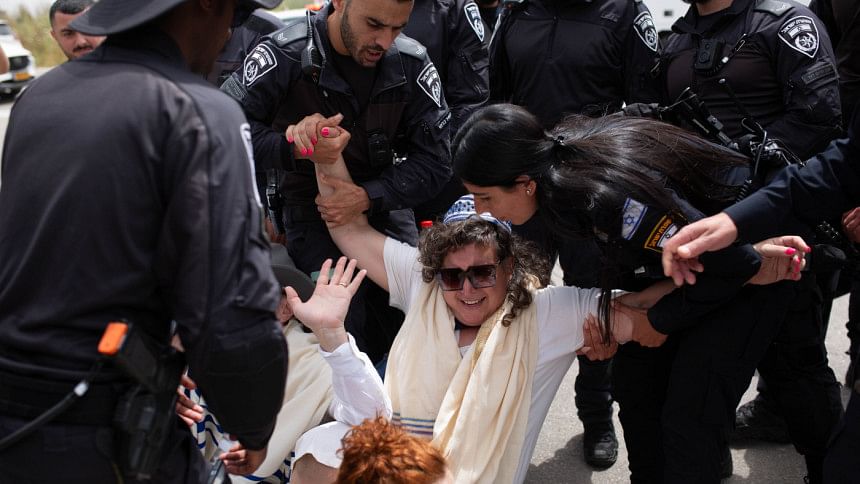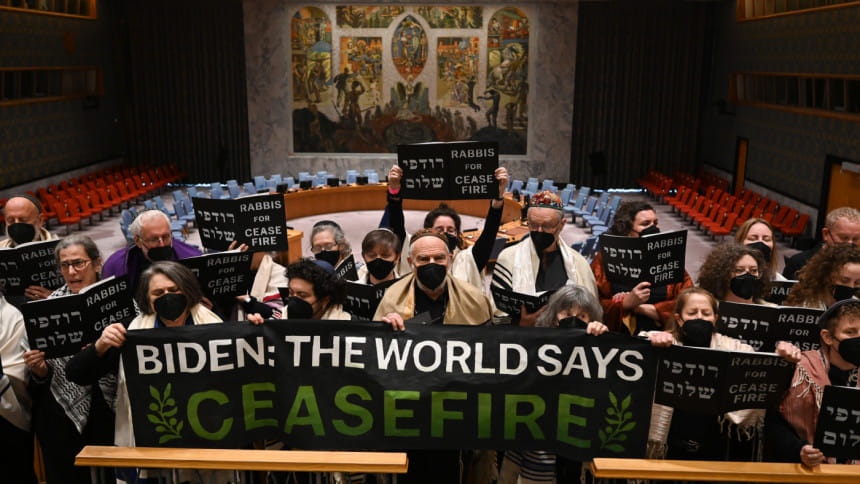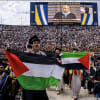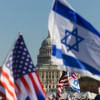'What's happening in Gaza is not a religious crisis'

Rabbi Alissa Wise, founder of Rabbis for Ceasefire, speaks to Ramisa Rob of The Daily Star in this exclusive interview about Jewish solidarity with Gaza, Zionism in Israel and the US, and the dehumanisation of Palestinians.
Can you describe the work you have been doing and what exactly led you to go to the Erez Crossing—between Israel and north Gaza—to deliver aid to Palestinians?
So I was raised in a Zionist community in the US, which is very pro-Israel. Throughout my childhood, I went to Israel many times with my family and in summer camps. When I was in college, I spent a year in the Hebrew University in Jerusalem, where I had the opportunity to learn about Nakba, the catastrophe and displacement of hundreds of thousands of Palestinians during the foundation of the state of Israel. I was shocked to learn, for the first time, that Palestinians were living under a system of occupation. I couldn't believe that the Jewish values that I was brought up with were being disregarded. When I applied the teachings of Judaism that I was taught growing up to real life, they led me to a life of seeking solidarity with the Palestinian people.
I became a rabbi in 2009, in Philadelphia, and for most of my career, I was a staff leader for Jewish Voice for Peace. When October 7 happened, there was a clear need in the Jewish community, of a reminder about what Judaism teaches: life, peace, and for our purposes, ceasefire. Before the ground invasion had even begun, I began organising a group of rabbis to call for a ceasefire. We did a series of events—outside the capitol building in Washington D.C., met with members of Congress for a ceasefire bill; we did an action inside the United Nations to draw attention to the Biden administration's continued veto of the ceasefire. We also organised interfaith work: a pilgrimage for peace walk from Philadelphia to Washington D.C.
As we were thinking about Passover this year—which is the season of our freedom, our liberation, and in the Passover story we talk about the obligation to feed people—we realised that the dire man-made famine of the 2.3 million people in Gaza was what needed our attention the most. So we at Rabbis for Ceasefire, in concert with Israeli leftists, organised a march to take food to Gaza, through the northern crossing, knowing the famine is most acute in the north.
Can you describe exactly what happened when you went to give aid to people in Gaza?
We had a tonne of rice and flour that we had brought with us in a truck. We had tried different ways to coordinate with a humanitarian organisation on the ground in Gaza to receive it on the other side, but the IDF (Israel Defense Forces) wasn't allowing them free movement. When we got to the crossing, on the morning of April 26, we pulled over on a side caravan to begin our walk to the crossing on foot. The police were already there, so it seemed that they were anticipating our arrival. So we were pushing forward by foot, with the bags of rice and flour, and we were chanting and singing verses of scripture and the Hagara. Then, at a certain point, the police started shoving us off the road and proceeded to start arresting us. They first arrested our Israeli leftist counterparts, then they took me and a couple of other women.
I was detained for about 10 hours. They told me, "You are being detained because you tried to bring food to Gaza." Then they said again, "You are being detained because you tried to bring rice and flour to Gaza." It was pretty shocking that this is a crime. They formally interrogated me and I reserved my right to remain silent throughout it. The female police officer pretended to turn off the recording device and said she just wanted to talk to me one on one. She told me, "I just really can't understand why you would do this, it doesn't make any sense," and then proceeded to say really horrific, genocidal comments. She said, "There are no innocents in Gaza, not even the babies, not even the foetuses in the womb." As she was talking, I saw on her desk, a picture of her with her toddler. The soldier herself is a mother and the fact that she's able to dehumanise Palestinian foetuses, babies to this extent, was truly stomach-turning.
What do you think is the reasoning behind this ingrained dehumanisation of Palestinians today?
For both Israeli Jews and American Jews—the context that I'm in—we are often taught that Israel is a social justice project of sorts, that the Jews of Eastern Europ (those who survived the Holocaust; and many of my family members died in the Holocaust) needed Israel because we cannot count on the world who turned its back on us. In fact, Netanyahu has said these exact words in a press conference recently. In our minds, Jews are always the victims of a genocide, not the perpetrators of it. People just don't wish to see or accept that Israel has in fact been acting like a vicious oppressor of Palestinians for decades. But Israel is a nation-state, it's not a person, and it is not "Jewish" because its behaviours such as denying Palestinians the right to life, freedom and dignity is not a Jewish value.

We are literally live-streaming the mass murder and mass destruction of Palestinians in Gaza, but people are still reluctant to call it what it is. Our work at Rabbis for Ceasefire is to hold fast to the moral traditions deeply embedded in Judaism and to allow it to pull ourselves back from this thirst for revenge, and this fantasy of eliminating Hamas. You can kill human beings but you just cannot destroy an ideology. We know that Hamas has long recruited from those who have had family members killed by the state of Israel, so think about the hundreds of thousands of people that it's true for now. There is now a whole new generation that is traumatised and they will be prone to hate. But American Jews and Israeli Jews are engaging in a fantasy that they wouldn't possibly be resisting in the way oppressed Palestinians are resisting now, and they want to believe that Palestinian are just inherently violent, that they don't deserve protection and that they in fact are no longer human. This is such a dangerous road to go down because when you dehumanise any people, you start with the Palestinians but then where's it going to end? We know all too well from Jewish history where dehumanisation ends.
How do you, as a rabbi and an activist, feel about the religious rhetoric in this crisis?
The crisis between Israelis and Palestinians is a political crisis. It is not a religious one. There are a lot of efforts to turn this into a centuries-old religious conflict, stoked primarily by Christian Zionists. Most of the Zionists in the US are not Jewish; they are Christians. There's a group called "Christians United for Israel," which hosts more than 11 million members—more than the entire population of Jews in the US. They are the dominant political force behind the US support for Israel. Understanding this is actually really important, because when the founding idea first came about to establish a Jewish state, in the late 1800s, the first idea was not that it would be in historic Palestine. There was a Uganda plan, and people were also looking at the far reaches of Eastern Europe. There was an urging and influence from the Christian Zionist movement, essentially those within the British Parliament, that tried to leverage the traditions of the Torah and Bible and utilise those for the Christian Zionist context, to hasten the "Second Coming," at which point Jews would either have to convert in mass to Christianity or burn. There is literally nothing more antisemitic than that.
What do you make of "antisemitism" since October 7? Is the meaning being warped?
I have been called a self-hating Jew, an anti-Semite. There's a person in my neighbourhood who puts a sticker on my house almost every week, that says "You don't speak for Jews." The thing to really understand is that critiquing the actions of the Israeli state is not inherently antisemitic. Anti-Jewish hatred is a totally different thing. If you are motivated to critique Israel, because Israel is being led by a group of Jews and you mistrust Jews, then that's antisemitism. But if you are critiquing Israel because you see the mass demolition of life in Gaza and understand the state's systemic oppression of the Palestinian people, that's a valid critique of a nation-state. That is not antisemitism.
There's an industry in order to confuse people. And the reasons why powerful people are feeding into that idea is because there is no other way to shield themselves from accountability and critique, and there is just no rationale for decades of siege. As the pro-Israel community is muddying the waters of what is antisemitism, they are actually leaving Jews more vulnerable to it. As a Jew, I feel less safe in the US given the activities of the pro-Israel community, who are willing to make common cause with White nationalists and Christian nationalists—the very people who have committed murderous attacks against Jews in the US.
Politically, one of the ways you can actually be a true friend is by telling people when they are going down the wrong path and having some form of accountability. As we now wait to see what kind of horrors unfold in Rafah—the US has to stop sending blank checks to send munitions that have killed over 15,000 children in Gaza. You don't aid and abet people who are committing such heinous war crimes. The blood is now on our hands, here in the US, and what we are seeing everyday—such as the mass graves being uncovered in Al-Shifa hospital—is why students on college campuses are willing to sacrifice their degrees, reputations, internships because they understand that if they right now allow these horrors to happen to Palestinians, what kind of future are they even going to be living in? If in the present, we allow these horrors to go unchallenged and the US government continues to fund them, the universities continue to profit off of them, then what will happen in the future?
How do you plan to further your activism within the Jewish community since your visit to Israel?
I'm still trying to absorb my brief experience in Israel. There is a tendency to start the clock on October 7, but we need to understand that the state of Israel has been using Jewish traditions as a fig leaf to compromise Palestinian life and devastate families and communities for the sake of militarised ethno-nationalism. At this point, we need to really reckon with that history and refuse these easy narratives such as, "Hamas hates Jews." No. Hamas resents being under the apartheid system that the Israeli government has set up. And I am not trying to defend Hamas at all; in fact, I myself am a non-violent activist and I don't support armed resistance. But I think we need to understand the context. When I was there in the region in April, I also saw American Jews in the West Bank from Florida setting up outposts and terrorising Palestinian communities from just ploughing their fields. We really have a responsibility to understand history, address reality and refuse these easy narratives.
What we faced in Israel has also reinforced for me how important the organisation Rabbis for Ceasefire is. We are now over 330 rabbis and Jewish clergy, who are calling together for a ceasefire at a time when many in the Jewish community are not just opposing ceasefire, but recently there was a rally where a Jewish member of Congress called for more humanitarian aid into Gaza, and he was booed by the crowd; thousands of New Yorkers booed the idea of allowing aid into Gaza. The moral crisis inside the Jewish community cannot be overstated. We need to sever this idea right now that Israel and Zionism is akin to Judaism—which is a centuries-old multifaceted religion fostering peace and life. Zionism is over a 125-year-old political movement. These are completely different tracks that have been pushed together for political expediency. Part of the work now is to pull them apart.
Primarily, we want to bring more attention to a ceasefire but it doesn't just end there. The day the bombs stop falling and the people of Gaza, God willing, are able to start putting their lives back together—some experts say it'll take two decades before the strip can be adequately restored—we still have to figure out how to ensure that the apartheid system ends. Immediate ceasefire is what's needed to save lives now, but we also need to look at long-term peace and justice. It's hard to imagine how to rebuild that society where there's such a deep level of hate and dehumanisation. I was talking to my Israeli comrade, and she said she's been been reading up on how Germany "de-Nazified" after World War II, to see how this could end and how Palestinians and Israelis can really live together. A lot of work—moral, spiritual and humanitarian—has to be done.
Follow The Daily Star Opinion on Facebook for the latest opinions, commentaries and analyses by experts and professionals. To contribute your article or letter to The Daily Star Opinion, see our guidelines for submission.

 For all latest news, follow The Daily Star's Google News channel.
For all latest news, follow The Daily Star's Google News channel. 








Comments